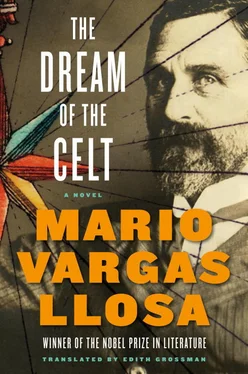He fell silent. He didn’t want his cousin to know he was about to cry too. No doubt because of his Puritan upbringing, since childhood he had despised public displays of sentiment, but in recent months he had sometimes indulged certain weaknesses that had once annoyed him so much in others. Gee said nothing. She still embraced him, and Roger felt her agitated respiration raising and lowering her chest.
“You were the only person I showed my poems to. Do you remember?”
“I remember they were dreadful,” said Gertrude. “But I loved you so much I told you they were wonderful. I even memorized one or two.”
“I knew very well you didn’t like them, Gee. It was lucky I never published them. I almost did, you know.”
They looked at each other and began to laugh.
“We’re doing everything, everything to help you, Roger,” said Gee, becoming very serious again. Her voice had aged too; firm and pleasant once, it was hesitant and cracked now. “We who love you, and there are many of us. Alice the first, naturally. Moving heaven and earth. Writing letters, visiting politicians, officials, diplomats. Explaining, pleading. Knocking at every door. She’s doing what she can to see you. It’s difficult. Only kin are permitted. But Alice is well known, she has influence. She’ll obtain permission and will come, you’ll see. Did you know that when the Dublin Rising broke out, Scotland Yard searched her house from top to bottom? They took a good number of papers. She loves and admires you so much, Roger.”
I know , Roger thought. He, too, loved and admired Alice Stopford Green. The Irish historian, like Casement from an Anglican family, whose house was one of the most crowded intellectual salons in London, the center for discussions and meetings of all the nationalists and Home Rulers from Ireland, had been more than a friend and adviser to him in political matters. She had educated him and obliged him to discover and love Ireland’s past, her long history and flourishing culture before she was absorbed by a powerful neighbor. Alice had recommended books, enlightened him in impassioned conversations, urged him to continue his lessons in the Irish language that, unfortunately, he never succeeded in mastering. I’ll die not speaking Gaelic , he thought. And later, when he became a radical nationalist, Alice was the first person in London who began calling him by the nickname Herbert Ward had given him that pleased him so much: “the Celt.”
“Ten minutes,” decreed the sheriff. “Time to say goodbye.”
He felt his cousin embrace him, her mouth trying unsuccessfully to reach his ear, since he was much taller. She spoke, thinning her voice so much it was almost inaudible:
“All those horrible things the papers are saying are slanders, wretched lies. Aren’t they, Roger?”
The question was so unexpected he hesitated a few seconds before answering.
“I don’t know what the press is saying about me, dear Gee. We don’t get papers here. But,” and he searched carefully for his words, “I’m sure they are. I want you to keep just one thing in mind, Gee. And believe what I say. Of course I’ve made many mistakes. But I have nothing to be ashamed of. You and my friends, none of you have to be ashamed of me. You believe me, don’t you, Gee?”
“Of course I believe you.” His cousin sobbed, covering her mouth with both hands.
On his way back to his cell, Roger felt his eyes filling with tears. He made a great effort to keep the sheriff from noticing. He rarely felt like crying. As far as he could recall, he hadn’t cried in all these months since his capture. Not during his questioning at Scotland Yard, or during the hearings at his trial, or listening to the sentence that condemned him to be hanged. Why now? Because of Gertrude. Because of Gee. Seeing her suffer in that way, doubt in that way, meant at the very least that for her, his person and life were precious. He was not, after all, as alone as he felt.
The journey of the British consul, Roger Casement, up the Congo River, which began on June 5, 1903, and would change his life forever, had been scheduled to begin the previous year. He had been suggesting this expedition to the Foreign Office since 1900 when, after serving in Old Calabar (Nigeria), Lourenço Marques (Mozambique), and São Paulo de Luanda (Angola), he officially took up residence as consul of Great Britain in Boma—a misbegotten village—claiming that the best way to prepare a report on the situation of the natives in the Congo Free State was to leave this remote capital for the forests and tribes of the Middle and Upper Congo. That was where the exploitation was occurring that he had been reporting to the Ministry of Foreign Relations since his arrival in these territories. Finally, after weighing those reasons of state that never failed to turn the consul’s stomach, even though he understood them—Great Britain was an ally of Belgium and did not want to push her into Germany’s arms—the Foreign Office authorized him to undertake the journey to the villages, stations, missions, posts, encampments, and factories where the extraction of rubber took place, the black gold avidly coveted now all over the world for tires and bumpers on trucks and cars and countless other industrial and household uses. He had to verify on the ground how much truth there was in the denunciations of atrocities committed against natives in the Congo of His Majesty Leopold II, king of the Belgians, made by the Aborigines’ Protection Society in London, and some Baptist churches and Catholic missions in Europe and the United States.
He prepared the journey with his customary meticulousness and an enthusiasm he hid from Belgian functionaries and the colonists and merchants of Boma. Now, with a thorough knowledge of the subject, he would be able to argue to his superiors that the Empire, faithful to its tradition of justice and fair play, should lead an international campaign to put an end to this ignominy. But then, in the middle of 1902, he had his third attack of malaria, one even worse than the previous two; he had suffered from the disease ever since he had decided in 1884, in an outburst of idealism and a dream of adventure, to leave Europe and come to Africa to work, by means of commerce, for Christianity, western social and political institutions, and the emancipation of Africans from backwardness, disease, and ignorance.
They weren’t merely words. He had a profound belief in them when, at the age of twenty, he reached the Dark Continent. The first attacks of malaria came some time later. He had just realized his life’s desire: to be part of an expedition headed by the most famous adventurer on African soil, Henry Morton Stanley. To serve at the pleasure of the explorer who in a legendary trek of close to three years between 1874 and 1877 had crossed Africa from east to west, following the course of the Congo River from its source to its mouth at the Atlantic! To accompany the hero who found the missing Dr. Livingstone! Then, as if the gods wanted to extinguish his exaltation, he suffered his first attack of malaria. Nothing, compared with the second, three years later—1887—and above all this third attack, in 1902, when for the first time he thought he would die. The symptoms were the same that dawn in the middle of 1902 when, his traveling bag already packed with maps, compass, pencils, and notebooks, he felt himself trembling with cold as he opened his eyes in the bedroom on the top floor of his house in Boma, in the colonists’ district, a few steps from Government House, which served as the consul’s residence and office. He moved aside the mosquito netting and saw through the windows, without glass or curtains but with metal screens to keep out insects and riddled now by a downpour, the muddy waters of the great river and the outline of islands covered with vegetation. He couldn’t stand. His legs collapsed under him, as if they were made of rags. John, his bulldog, was frightened and began to jump and bark. He let himself fall back into bed. His body was burning and the cold penetrated his bones. He shouted for Charlie and Mawuku, the Congolese steward and cook who slept on the lower floor, but no one answered. They must have gone out and, caught by the storm, run to take shelter under a baobab tree until it abated. Malaria again? The consul cursed. Just on the eve of the expedition? He would have diarrhea; hemorrhages and weakness would oblige him to stay in bed for days, weeks, dazed and shivering.
Читать дальше












